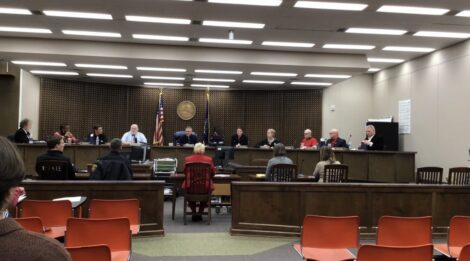State Incentives Aiding Dissolutions For Taxpayers
State incentives such as the Citizens Empowerment Tax Credit are making village dissolutions more appealing from a tax standpoint.
Over the past year, residents in the villages of Cherry Creek and Forestville voted to end their village government and obtain services from the towns of Cherry Creek and Hanover. Dissolutions came amid growing financial issues and high taxes, which are normally higher compared to town residents given the added layer of government involved.
A vote was also up for the village of Sherman’s dissolution in December. That failed by a two-vote margin.
The Forestville dissolution took effect January, and data by The Post-Journal shows taxes on the average $100,000 home went down by $536 when adding together county, town and schools taxes. As for Hanover, town taxes on the average home saw a modest increase of $2.63.
In the case of the dissolution, a Citizens Empowerment Tax Credit was applied to bring local property taxes down by about 50 percent for residents. The incentive through the Department of State’s Office of Local Government gives merged municipalities an annual tax credit equal to 15 percent of the combined property tax levy of the merging communities.
The Center for Governmental Research conducted the dissolution study for Forestville. In their report, CGR noted the Citizens Empowerment Tax Credit has a substantial impact on the tax rate. They also noted that spreading expenses of government services over a larger tax base would have a greater impact on the future tax rate.
When it comes to reducing layers of government, consolidation and sharing services is the quickest path to go, according to county legislator George Borrello, R-Hanover. In the case of Hanover, Borrello said many people pointed out that the idea of consolidating was looked at years ago and that it would raise taxes.
But he said that was before the 2 percent property tax cap, which honed in tax raises allowed in a year, and the availability of incentives provided by the state. A large portion of the Citizens Empowerment Tax Credit goes to reducing property taxes while a small percentage is used for discretionary spending by the town.
“There are so many incentives provided under the Citizens Empowerment Tax Credit that it makes it advantageous for village and town residents,” Borrello said. “Some of the highest taxed people in our county on a cost per $1,000 basis are people who live in villages just by the nature of the fact that there’s an extra layer of government.”
Along with incentives, Borrello said the town in which the village dissolved plays a key role in determining how taxes are structured. While Hanover residents saw a slight increase in their tax bills, the CGR report stated that the impact would be less than $5 per month on a median home.
In February, village residents in Cherry Creek voted to dissolve. Through the Citizens Empowerment Tax Credit, the town is receiving $96,000. The credit will be paid to the town every year in the future unless the state Legislature changes the law.
CGR estimates the townwide rate of 7.18 per $1,000 of assessed value would go down to around $6 per $1,000 of assessed value. For village residents with a home valued at the $61,500 median, the savings in town taxes would be about $70 per year. The village tax rate would fall to zero for savings of over $900 per year.
The village hasn’t officially dissolved yet. As of June, officials were reviewing the dissolution study.
An analysis shows taxes on the average home in the village decreased by $347 over the year. Much of the tax drop stemmed from a decrease in village taxes. Taxes in past years remained high, and that was due to the costs associated with an old school that had to be torn down.
Work is underway on a potential consolidation between the towns of Gerry and Charlotte as well as a possible dissolution of Sinclairville. The proposal is part of the county’s application to the state’s Municipal Consolidation and Government Efficiency Competition, which has $20 million at stake.
Voters in the towns would need to approve the consolidation and village residents would need to grant dissolution for anything to move forward. Borrello said he’s optimistic that both scenarios will happen given the incentives involved.





